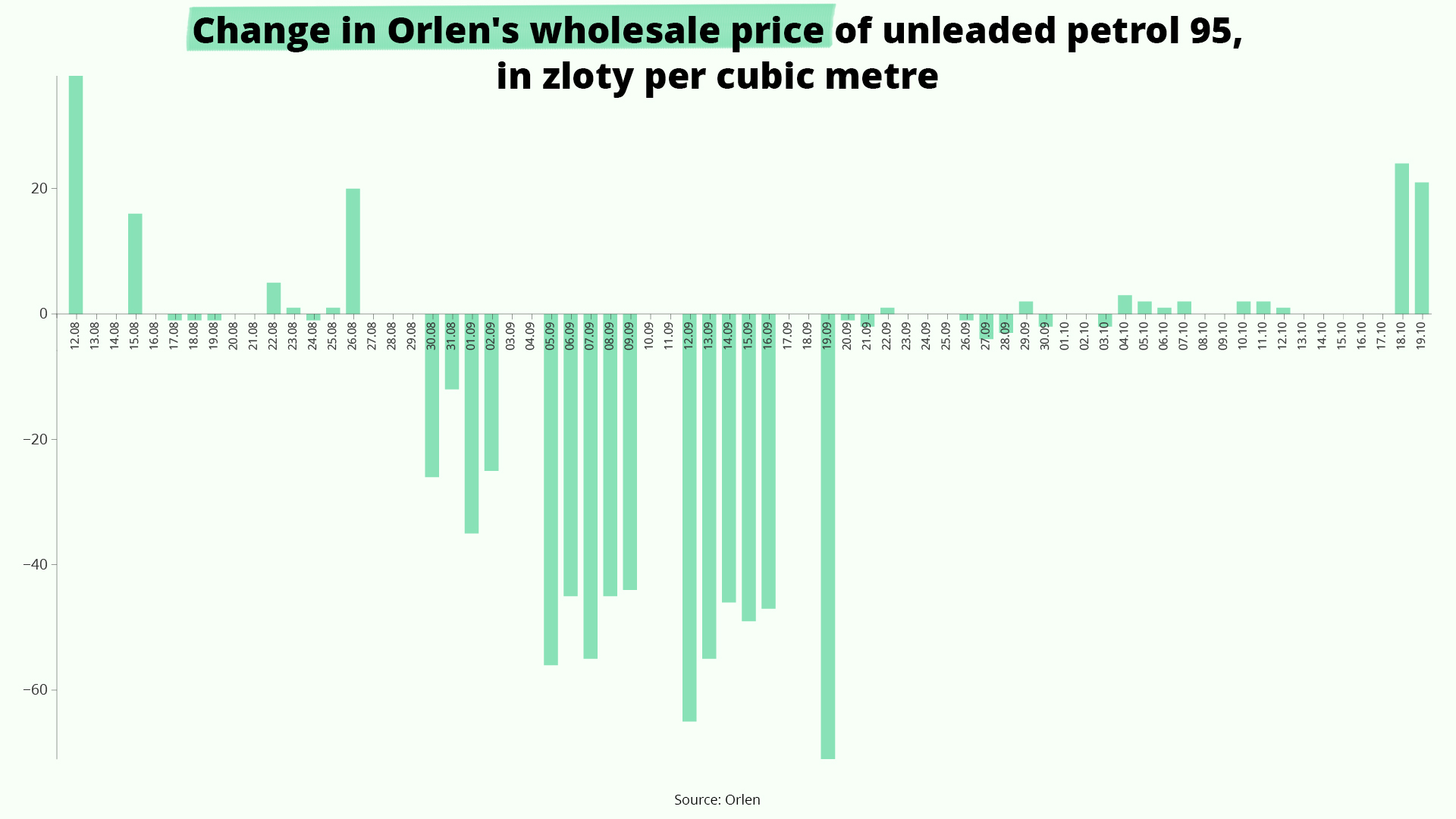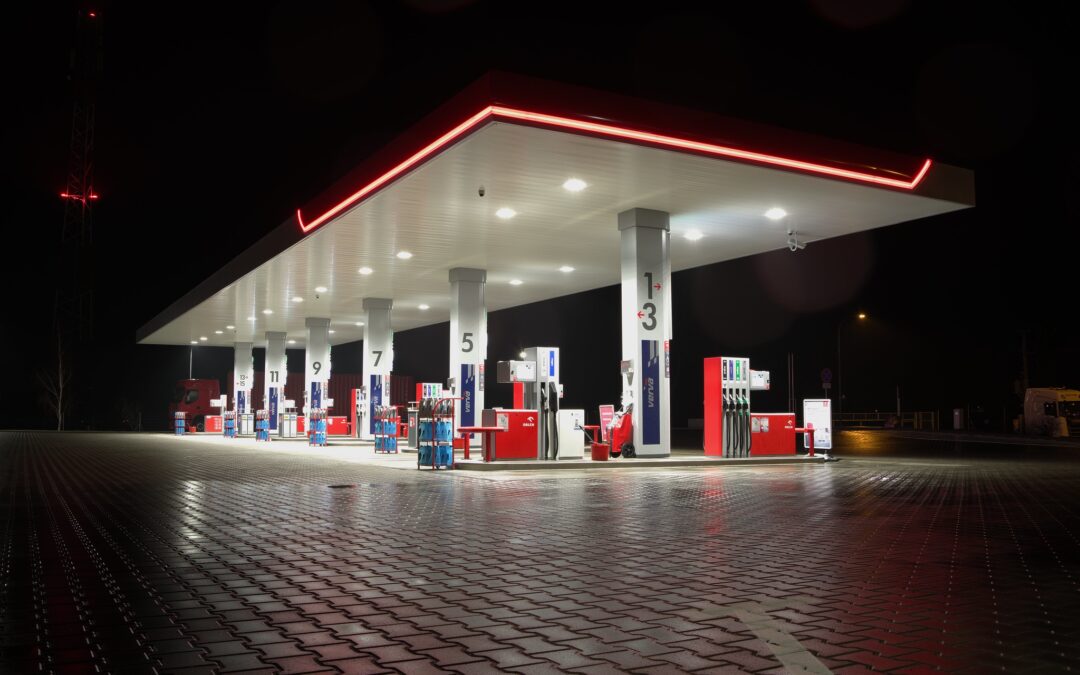The wholesale price of petrol sold by state energy giant Orlen has substantially risen this week after remaining depressed in the weeks leading up to Sunday’s elections.
Some experts and the opposition had accused Orlen of artificially lowering prices to help the ruling Law and Justice (PiS) party’s re-election campaign. They warned that prices would rise again once the elections were over. Orlen, however, has strongly denied such claims.

At the end of August, Orlen began sharply reducing its wholesale petrol prices, and later also the prices at petrol stations. By 3 October (the last day with a price drop) the whole price of unleaded petrol at wholesale had fallen by nearly 12.7%.
Average fuel prices at petrol stations fell by around 10% during the same period period. Orlen controls around 60% of Poland’s fuel market.
The move, however, puzzled experts, who pointed to factors that should have pushed fuel prices in the opposite direction, i.e. rising oil prices on international markets and a weakening zloty.
Some motorists began coming to Poland from neighbouring countries, where prices remained higher, to tank up at Polish petrol stations. Some Poles also took advantage of the low prices to stockpile fuel, something Orlen appealed to them not to do.
State oil giant Orlen has appealed to Poles not to hoard fuel amid a drop in prices at petrol stations ahead of October's elections.
The firm has denied claims it is artificially lowering prices to help the government’s re-election bid https://t.co/YsO1oGUDbJ
— Notes from Poland 🇵🇱 (@notesfrompoland) September 27, 2023
Yesterday, the price of unleaded petrol rose by 24 zloty (€5.39) to 4,778 zloty (€1,072) per cubic metre, by far the biggest increase since 12 August. Today, the price rose further by 21 zloty (€4.71) to 4,799 zloty (€1,077).
Those rises came despite a strengthening of the zloty after the elections, which makes buying crude oil cheaper for domestic refineries.
However, the price still remains well below the level of 5,403 zloty (€1,212) per cubic metre seen at the end of August, when the drops began.
“[The price] is still significantly below what the market situation implies, but it is clear that Orlen has already started to make its rates more realistic,” wrote Robert Tomaszewski, energy analyst at Polityka Insight, a think tank.
Czech "petrol tourists" have been crossing the border to tank up in Poland, taking advantage of lower prices ahead of October's elections.
Analysts say state energy giant Orlen has pushed down prices to help the ruling party, but the firm denies it https://t.co/qgLL5o6SQy
— Notes from Poland 🇵🇱 (@notesfrompoland) September 22, 2023
The rise was also noted by several other experts. Beneath a post by one of them, CMC Markets Poland chief markets analyst Daniel Kostecki, Orlen responded publicly by defending the rises, but without explaining their source.
“Wholesale prices for petrol and diesel have increased by around 2 grosze per litre. This is a difference that does not translate into retail prices for our customers,” noted the Orlen’s press office.
“That’s right,” Kostecki responded. “Could you please write where we get such cheap fuel, in such quantities?” This question, however, remained unanswered.
Zgadza się :). Czy mogliby Państwo napisać, skąd mamy tak tanie paliwo, w takiej ilości?
Jak w USA uwalniali SPR, to mówili o tym, jak we Francji sprzedają po kosztach, też o tym mówili.
Czy możemy liczyć na otwartość w komunikacji?
— Daniel Kostecki, CAI (@Dan_Kostecki) October 18, 2023
At the beginning of the week – in the wake of the elections, at which PiS won but failed to maintain its ruling majority, meaning it is likely to lose power – Orlen claimed that prices at the pump would remain “stable” in the near term.
However, analysts disagree with such predictions. “According to our forecasts, prices in November may even approach 7 zloty per litre,” up from a current average of 6.05 zloty per litre for unleaded petrol, Jakub Bogucki of industry website e-petrol.pl told business outlet INNPoland.

Notes from Poland is run by a small editorial team and published by an independent, non-profit foundation that is funded through donations from our readers. We cannot do what we do without your support.
Main image credit: Jerzy Jabłoński / Flickr (under CC BY-NC-ND 2.0 DEED)

Alicja Ptak is deputy editor-in-chief of Notes from Poland and a multimedia journalist. She has written for Clean Energy Wire and The Times, and she hosts her own podcast, The Warsaw Wire, on Poland’s economy and energy sector. She previously worked for Reuters.



















